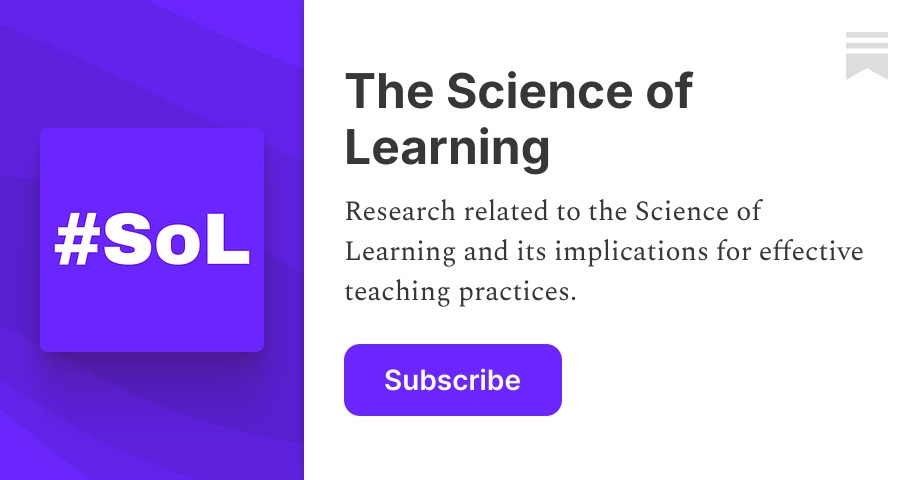scienceoflearning.substack.com/p/beyond-belief-reframing-teaching/comment/134512955
Preview meta tags from the scienceoflearning.substack.com website.
Linked Hostnames
3Thumbnail

Search Engine Appearance
John Wills Lloyd on The Science of Learning
Belinda, I regret that the standard way to publish educational research (and research in most disciplines) is via businesses (i.e., journals) that seek compensation for access to the publications. There is an effort by some to promote "open science," one pillar of which is open access. The Center for Open Science is a good source for more information about the efforts. In addition, some journals are adopting open access policies. In special education an example is Research in Special Education from the Alethia Society https://aletheia-society.org I should note, though you probably know this, that authors (the researchers) do not get rich from the fees that publishers charge for access to the research reports. The authors may gain in academic reputation from the publications, but they don't get paid royalties as they would for, say, a book. In fact, journal publishers charge literally $1000s to authors that want their articles be freely accessible. There are sites that seek to circumvent the closed access system. ResearchGate and Academia are a couple of them. But, in answer to your question about why research is behind paywalls, I offer this simple explanation: $$. JohnL p.s. If you can't get access to an article on which I'm an author, write to me directly. I can send you a copy.
Bing
John Wills Lloyd on The Science of Learning
Belinda, I regret that the standard way to publish educational research (and research in most disciplines) is via businesses (i.e., journals) that seek compensation for access to the publications. There is an effort by some to promote "open science," one pillar of which is open access. The Center for Open Science is a good source for more information about the efforts. In addition, some journals are adopting open access policies. In special education an example is Research in Special Education from the Alethia Society https://aletheia-society.org I should note, though you probably know this, that authors (the researchers) do not get rich from the fees that publishers charge for access to the research reports. The authors may gain in academic reputation from the publications, but they don't get paid royalties as they would for, say, a book. In fact, journal publishers charge literally $1000s to authors that want their articles be freely accessible. There are sites that seek to circumvent the closed access system. ResearchGate and Academia are a couple of them. But, in answer to your question about why research is behind paywalls, I offer this simple explanation: $$. JohnL p.s. If you can't get access to an article on which I'm an author, write to me directly. I can send you a copy.
DuckDuckGo
John Wills Lloyd on The Science of Learning
Belinda, I regret that the standard way to publish educational research (and research in most disciplines) is via businesses (i.e., journals) that seek compensation for access to the publications. There is an effort by some to promote "open science," one pillar of which is open access. The Center for Open Science is a good source for more information about the efforts. In addition, some journals are adopting open access policies. In special education an example is Research in Special Education from the Alethia Society https://aletheia-society.org I should note, though you probably know this, that authors (the researchers) do not get rich from the fees that publishers charge for access to the research reports. The authors may gain in academic reputation from the publications, but they don't get paid royalties as they would for, say, a book. In fact, journal publishers charge literally $1000s to authors that want their articles be freely accessible. There are sites that seek to circumvent the closed access system. ResearchGate and Academia are a couple of them. But, in answer to your question about why research is behind paywalls, I offer this simple explanation: $$. JohnL p.s. If you can't get access to an article on which I'm an author, write to me directly. I can send you a copy.
General Meta Tags
15- titleComments - Beyond belief: Reframing teaching as a science-based profession
- title
- title
- title
- title
Open Graph Meta Tags
7- og:urlhttps://scienceoflearning.substack.com/p/beyond-belief-reframing-teaching/comment/134512955
- og:imagehttps://substackcdn.com/image/fetch/$s_!bSHF!,f_auto,q_auto:best,fl_progressive:steep/https%3A%2F%2Fscienceoflearning.substack.com%2Ftwitter%2Fsubscribe-card.jpg%3Fv%3D-334626226%26version%3D9
- og:typearticle
- og:titleJohn Wills Lloyd on The Science of Learning
- og:descriptionBelinda, I regret that the standard way to publish educational research (and research in most disciplines) is via businesses (i.e., journals) that seek compensation for access to the publications. There is an effort by some to promote "open science," one pillar of which is open access. The Center for Open Science is a good source for more information about the efforts. In addition, some journals are adopting open access policies. In special education an example is Research in Special Education from the Alethia Society https://aletheia-society.org I should note, though you probably know this, that authors (the researchers) do not get rich from the fees that publishers charge for access to the research reports. The authors may gain in academic reputation from the publications, but they don't get paid royalties as they would for, say, a book. In fact, journal publishers charge literally $1000s to authors that want their articles be freely accessible. There are sites that seek to circumvent the closed access system. ResearchGate and Academia are a couple of them. But, in answer to your question about why research is behind paywalls, I offer this simple explanation: $$. JohnL p.s. If you can't get access to an article on which I'm an author, write to me directly. I can send you a copy.
Twitter Meta Tags
8- twitter:imagehttps://substackcdn.com/image/fetch/$s_!bSHF!,f_auto,q_auto:best,fl_progressive:steep/https%3A%2F%2Fscienceoflearning.substack.com%2Ftwitter%2Fsubscribe-card.jpg%3Fv%3D-334626226%26version%3D9
- twitter:cardsummary_large_image
- twitter:label1Likes
- twitter:data12
- twitter:label2Replies
Link Tags
31- alternate/feed
- apple-touch-iconhttps://substackcdn.com/image/fetch/$s_!-P6p!,f_auto,q_auto:good,fl_progressive:steep/https%3A%2F%2Fsubstack-post-media.s3.amazonaws.com%2Fpublic%2Fimages%2F1fb6030c-ec25-496c-b7e7-3100fefa72ad%2Fapple-touch-icon-57x57.png
- apple-touch-iconhttps://substackcdn.com/image/fetch/$s_!COQ1!,f_auto,q_auto:good,fl_progressive:steep/https%3A%2F%2Fsubstack-post-media.s3.amazonaws.com%2Fpublic%2Fimages%2F1fb6030c-ec25-496c-b7e7-3100fefa72ad%2Fapple-touch-icon-60x60.png
- apple-touch-iconhttps://substackcdn.com/image/fetch/$s_!2aJr!,f_auto,q_auto:good,fl_progressive:steep/https%3A%2F%2Fsubstack-post-media.s3.amazonaws.com%2Fpublic%2Fimages%2F1fb6030c-ec25-496c-b7e7-3100fefa72ad%2Fapple-touch-icon-72x72.png
- apple-touch-iconhttps://substackcdn.com/image/fetch/$s_!vNlw!,f_auto,q_auto:good,fl_progressive:steep/https%3A%2F%2Fsubstack-post-media.s3.amazonaws.com%2Fpublic%2Fimages%2F1fb6030c-ec25-496c-b7e7-3100fefa72ad%2Fapple-touch-icon-76x76.png
Links
14- https://aletheia-society.org
- https://scienceoflearning.substack.com
- https://scienceoflearning.substack.com/p/beyond-belief-reframing-teaching/comment/134512955
- https://scienceoflearning.substack.com/p/beyond-belief-reframing-teaching/comments#comment-134512955
- https://substack.com